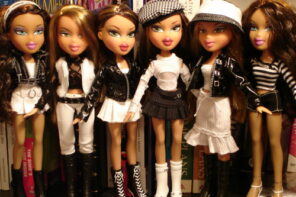“I was like no, like I finna be in the pit.”
This viral statement was made by social media influencer Tara Lynn (@taraswrld) in a post to her TikTok page in October of 2022. In the video, Lynn relays a phone conversation between her and a StubHub employee regarding tickets to a Harry Styles concert in Los Angeles. In the two-and-a-half-minute long clip, Tara Lynn explains that her general admission floor tickets purchased on StubHub never reached her email and that the employee, who refused to replace them, offered her balcony tickets instead. In response to this, Lynn famously insisted “no, like I finna be in the pit” – meaning that she only wanted floor (“pit”) tickets. The influencer then goes on to explain that she had to turn to other online vendors to obtain two of this type of ticket, which ultimately cost her nearly ten thousand dollars.
Tara Lynn’s video quickly gained notoriety for its multifaceted absurdity. TikTok users primarily remarked the outrageous price of the tickets and Lynn’s flagrant unrelatability in purchasing them. However, the video also amassed millions of views because of the bizarre catchphrase “I’m finna be in the pit”.
The now infamous line serves as an eminent example of the Internet Accent, combining many elements of the “chronically online” speech patterns pervasive in Generation Z.
Perhaps due to its polysemy and versatility, the word “like” is employed generously (or overemployed, debatably) by Gen Z. Tara Lynn, who uses it twice in the span of one sentence, is no exception to this. In fact, the first “like” is self-quotative (where Lynn restates what she said to the StubHub employee with a quintessentially “young-person” use of the word) and the second “like”, a relatively superfluous addition to the phrase, acts as a discourse particle. The function of the latter is interpersonal according to sociolinguist Alexandra D’arcy. In her 2008 article Canadian English as a Window To the Rise of Like In Discourse, she explains that the word “like”, when employed as a discourse particle, “[aids] cooperative aspects of communication (e.g. checking or expressing understanding), and [generates] a sense of sharing or intimacy between interlocutors.” Finally, despite the heavy use of “like” being typically associated with uncertainty or lazy speech, D’arcy argues that the word “appears in a variety of syntactic positions, “has arisen systematically” and is not employed even remotely haphazardly.
To further strengthen the connection with her audience throughout the video, Lynn (consciously or unconsciously) speaks with what linguists call “uptalk”, meaning that she finishes many of her sentences with rising intonation. This inflection, also known as high rising terminal (HRT), has become increasingly popular with social media influencers in their attempt to maintain viewer attention and engagement. Uptalk has gained enough usage, especially in younger and predominantly female individuals, that sociolinguists have begun to recognize it as an important aspect of what some call the “TikTok Voice”.
Tara Lynn’s use of the word “finna” also sparked controversy online. The word, which originates from African American Vernacular English (AAVE), is a contraction of “fixing to”, in the sense of preparing to do something. Lynn’s evident misuse of the word (she should have said “I’m gonna be in the pit”) is just one example of the popularisation of AAVE through social media and a catalyst for discourse surrounding the dialect and cultural appropriation. In fact, Gen Z is often unaware of the cultural dialectical origins of their favourite slang words, or grossly misuses them until they take on a completely new meaning (think of “gyatt”, which originated in AAVE as an exclamation but is now used on the internet to reference a person’s backside).
I can tell exactly how much time my Gen Z peers spend on the internet based on how similar they sound to Tara Lynn. The degree to which they are “chronically online” is revealed by their misuse of AAVE or their use of TikTok neologisms like “to lock in”, “grindset”, “cooked”, or “Roman empire” in their speech. Although this may seem like a banal assertion, I’ve noticed that these TikTok-isms are not only infiltrating everyday conversations, but also formal communication, much more quickly and easily than other non-internet slang words – and I am worried.
The touchscreen barrier that retains niche internet slang from real-world use has gained considerable permeability. As people spend more time on the internet where informal language is the norm, it seems that they are less cognizant of how they speak and of their level of formality in a given context. Whether it’s a teaching assistant calling a student who hasn’t studied for a midterm “cooked” or hearing a colleague use “grindset” in a conversation with your boss, the Internet Accent seems to chip away at the professional distance and relational expectation between two individuals at different levels of authority.
Despite Tara Lynn’s “I finna be in the pit” line not being spoken in a formal setting, it does regroup many of the linguistic phenomena that are beginning to transcend digital spaces. Although the role of social media as an unstoppable motor of linguistic change is undeniable, the speech patterns it creates need not imbue every form of communication. In addition to simply not wanting to hear my younger professors speak like a TikTok comment section, I believe that there is value in formality – we don’t all need to talk to each other in the same lax way. And even if much of pre-existing slang seems to have been kept out of the formal conversation, many fresh-out-of-the-TikTok-oven neologisms seem immune to this rule – whether this is because the Internet Accent is a global phenomenon, or perhaps because internet slang is simply a worldwide inside joke that everyone is in on.








